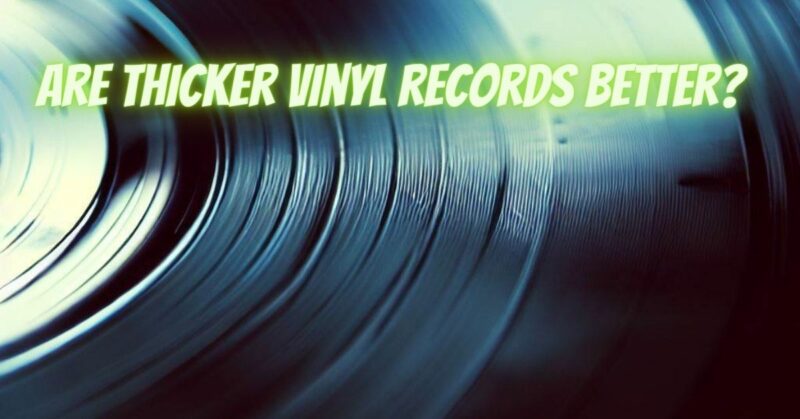The resurgence of vinyl records has brought with it a plethora of discussions and debates about various aspects of the vinyl experience. Among these debates is the question of whether thicker vinyl records truly offer a superior listening experience. This article aims to shed light on the myth surrounding thicker vinyl records and explore the factors that contribute to their perceived benefits and limitations.
Understanding Thicker Vinyl: Thicker vinyl records, often ranging from 180g to 200g, have gained a reputation for potentially delivering enhanced sound quality and durability. This reputation is rooted in the belief that the added thickness can influence the way the record interacts with the turntable’s stylus, leading to improved playback.
Sound Quality Considerations:
- Potential for Improved Sound: Thicker vinyl records can have reduced vibrations and resonances during playback due to their added weight. This can lead to enhanced clarity, dynamics, and overall sound quality.
- Varied Impact: While some listeners swear by the superior sound quality of thicker vinyl, it’s important to note that the quality of mastering, pressing, and vinyl compound all play crucial roles in determining the final sound of the record.
Durability and Warping:
- Perceived Durability: Thicker records are often considered to be less prone to warping compared to thinner records, as the added weight contributes to a flatter playing surface.
- Proper Storage Matters: Regardless of thickness, proper storage conditions are essential to prevent warping. Vinyl records should be stored upright in a cool, dry environment away from direct sunlight and extreme temperature changes.
Collector Appeal and Perceived Value:
- Collector Attraction: Thicker vinyl records are often perceived as premium products and can carry a higher collector’s appeal due to their weight and potential for improved sound.
- Aesthetic Value: The tactile experience of handling a thicker record can contribute to the overall aesthetic and perceived value of the vinyl.
Quality of Mastering and Pressing: Thicker vinyl records can only deliver their potential benefits if they are meticulously mastered and pressed using high-quality materials and techniques. Poor mastering and pressing can undermine the potential advantages of thickness.
Personal Listening Preference: Ultimately, the decision on whether thicker vinyl records are better comes down to personal preference. Some listeners appreciate the enhanced sound quality and durability, while others prioritize the music itself and may not perceive significant differences in sound between thinner and thicker records.
The belief that thicker vinyl records are inherently better is a nuanced topic. While added thickness can influence certain aspects of playback and durability, it’s important to remember that the quality of mastering, pressing, and vinyl compound play substantial roles in determining the final sound and overall quality of the record. Whether you’re drawn to the charm of vintage thin records or the potential benefits of thicker ones, the true magic of vinyl lies in the connection to the music and the analog experience it provides.


